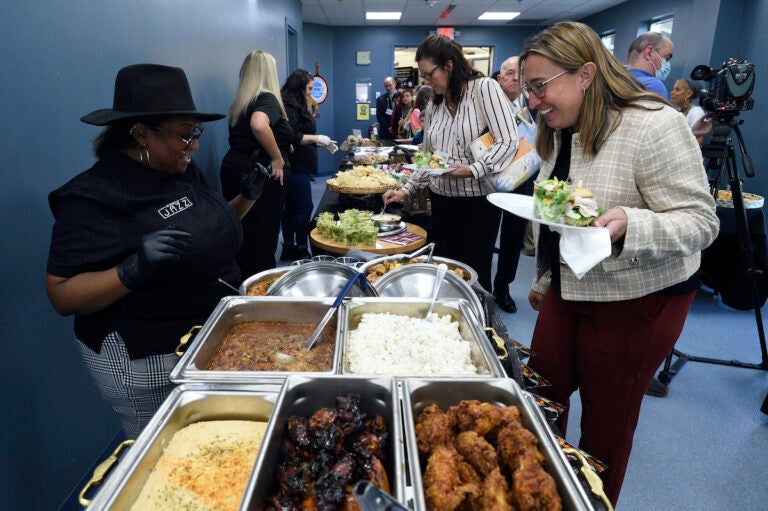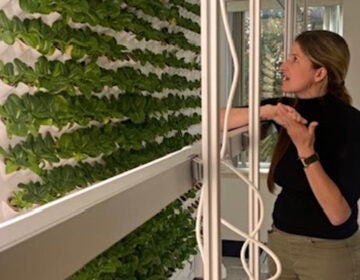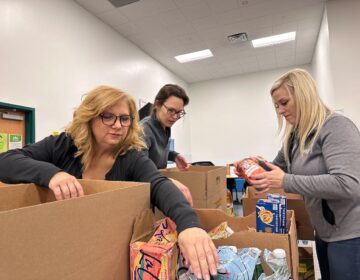Cooking up success, southern Delaware kitchen incubator aims for culinary revolution
The Georgetown facility provides a much-needed solution for business owners facing challenges in finding a place to cook in southern Delaware.

During the grand opening, food entrepreneurs from Georgetown, Del.’s new Kitchen Incubator served their culinary creations. (Courtesy of Kitchen Incubator)
From Philly and the Pa. suburbs to South Jersey and Delaware, what would you like WHYY News to cover? Let us know!
Starting a small food business just got easier in southern Delaware after county officials unveiled a new kitchen incubator to support “foodpreneurs” looking for a space to cook up their fusion of food blends.
Items now being produced at the centralized kitchen range from key lime pies to hot sauce, breads, and pizzas. The initiative is helping pave a new career pathway for residents in mostly rural Sussex County.
The county’s director of economic development Bill Pfaff identified the need for a commercial kitchen to help small businesses produce their goods.
“One of the things that I constantly heard from foodpreneurs was there wasn’t space for them to produce their product to take the commercialization because you must produce your food products in a licensed commercial kitchen,” Pfaff said.
The pandemic hindered the county’s efforts to get the kitchen up and running.
“I started working on this kitchen incubator pre-COVID, and then COVID hit, everything had to come to a standstill, but we never gave up, we continued to work on it,” he said. “It ended up taking a little bit more work to do because of the federal shutdown.”
After years of effort, the incubator was finally made available for use in a soft launch in late April, with two dozen food business owners currently utilizing the space. The grand opening attracted a wave of entrepreneurs eager to leverage this innovative resource.
Jessica Williamson of Milton was part of that first wave with Coastal Key Lime Pie, the company she co-owns. The creation of the kitchen incubator allowed Williamson and her husband Lee to bring their unique key lime pie to the coastal area.

Since discovering the incubator at Delaware Technical Community College’s Georgetown campus, the pastry chef says the demand for her pies has skyrocketed.
“We were the one of the first ones to sign up, this was back in May,” Williamson said. “That allowed us to quickly get our permit to be able to sell the pies at our local farmers market and we really [have] grown since then pretty amazingly … it was just hard to keep up [with] the demand.”
After working in human resources for more than 15 years, Williamson says she never imagined branching out into a new career. But with the foundation provided by the kitchen incubator, the couple now plans to open their own kitchen nearby.
“This is like a totally new industry for us to learn and grow in. I’ve done this my whole career and now I’m ready to try something new and venture out and see where it takes us,” she said. “We’ve already started plans for renovating our own space and having our own little small kitchen, which will be in Seaford.”

Pfaff says the incubator helps entrepreneurs deal with the big expense of starting a food-based business, including building a kitchen from scratch, providing their own kitchen tools, and doing maintenance.
“The purpose of the kitchen incubator was to help remove restrictive barriers of high cost capital investment associated with leasing or purchasing a commercial kitchen and kitchen equipment,” Pfaff said. “We’ve taken that headache out of the mix.”
“The kitchen incubator also reduces the risk of failure by removing additional startup barriers in areas of managing and maintaining a commercial kitchen,” he said. “We take care of everything.”
In addition to providing the kitchen to cook with, the county also offers resources needed to elevate the business.
“We also provide technical assistance in training and value-added services related to distribution, branding, marketing, pricing, insurance, legal services and financial opportunities,” he said. “When you go into business being a foodpreneur, being an entrepreneur, you’re working for the business. You want to get it to a point where the biggest business begins to work for you and we give you those tools to achieve that.”
To take advantage of this resource, individuals have to be in good standing with state permit requirements, obtain the ServSafe certification, and be insured. Afterwards individuals are able to pay for a membership to gain access to the kitchen.
After that, it’s up to them to bring the food and start cooking away.
WHYY is your source for fact-based, in-depth journalism and information. As a nonprofit organization, we rely on financial support from readers like you. Please give today.







